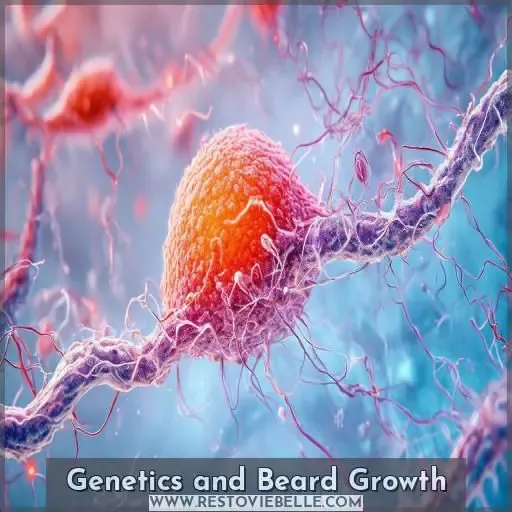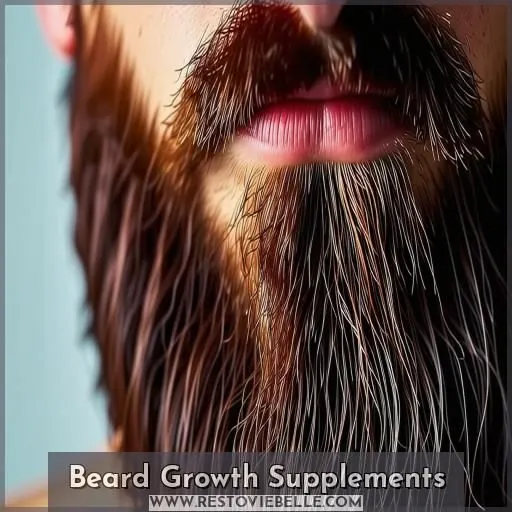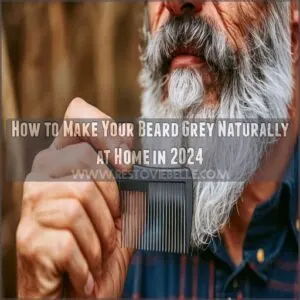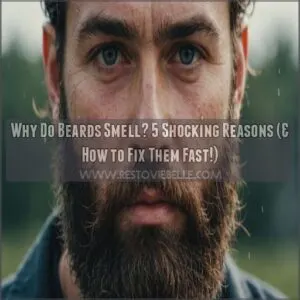This site is supported by our readers. We may earn a commission, at no cost to you, if you purchase through links.
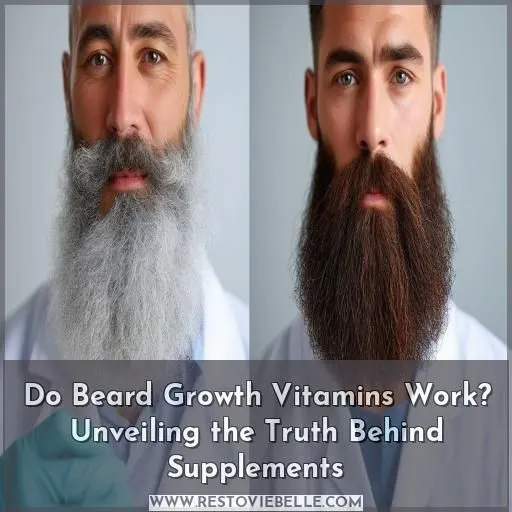 You’ve seen the alluring ads promising miraculous beard growth with "beard vitamins," but do they actually work?
You’ve seen the alluring ads promising miraculous beard growth with "beard vitamins," but do they actually work?
The truth is, beard growth vitamins have little scientific backing. While nutrients like biotin, zinc, and vitamin C support healthy hair, there’s no proof that over-the-counter supplements directly promote beard gains.
Your genes largely determine your beard’s potential. However, lifestyle factors like diet, stress, and sleep play a role too.
If deficient in certain nutrients, supplements may help—but they won’t magically generate luscious facial hair. To maximize your beard’s genetic destiny, focus on overall wellness.
And if you keep reading, you’ll uncover more insightful details.
Table Of Contents
- Key Takeaways
- Do Beard growth vitamins Work?
- Genetics and Beard Growth
- Nutrients for Hair Health
- Lifestyle Factors
- Medical Conditions
- Beard Growth Supplements
- Frequently Asked Questions (FAQs)
- Do vitamins actually help beard growth?
- Does anything actually help beard growth?
- Which vitamin grows a beard?
- How can I increase my beard growth?
- Are beard growth vitamins effective for all men?
- Can beard growth vitamins cause any side effects?
- How long does it take to see results?
- Do beard growth vitamins work for patchy beards?
- Are there any age restrictions for using them?
- Conclusion
Key Takeaways
- While supplements like biotin and zinc can support overall hair health, there’s no magic potion to override your genetic beard growth potential. Managing expectations is key.
- Don’t put all your eggs in the vitamin basket – lifestyle factors like stress, sleep, and nutrition play a significant role in unlocking your beard’s full glory. Nourish your follicles from the inside out.
- If your beard is patchy or lackluster, no need to break the bank on dubious supplements. Focus on balancing your diet with protein, iron, and vitamin D-rich foods – your beard will thank you.
- Remember, a lush beard is a marathon, not a sprint. Be patient and consistent with your grooming routine, and your facial forest will flourish in due time. After all, Rome wasn’t built in a day!
Do Beard growth vitamins Work?
Yes, beard growth vitamins can work to a certain extent. Supplements containing nutrients like biotin, vitamins C, D, and E, and minerals like zinc can promote hair health and potentially boost beard growth, but their effectiveness is limited by individual genetic factors.
Genetics and Beard Growth
Your genetics play a significant role in beard growth potential. Family history and ethnic background influence hair growth patterns.
Some men effortlessly grow thick, luscious beards, while others struggle.
Cultural norms also shape perspectives on facial hair.
Before considering supplements, understanding your genetic predisposition is key.
Protein and zinc support hair health, but won’t override genetic limitations.
Managing expectations aligns with your natural beard growth capacity.
Nutrients for Hair Health
To encourage healthy beard growth, it’s essential to provide your body with sufficient protein, which is vital for hair production and upkeep. Furthermore, certain vitamins such as biotin and minerals such as zinc play supportive roles in maintaining hair health, although their efficacy in directly enhancing beard growth remains a topic of debate.
Protein
You can’t grow a glorious beard without protein. This building block:
- Nourishes hair follicles
- Supports keratin production
- Enhances overall hair health
- Dietary sources include meat, eggs, dairy
- Vegetarians may need supplementation
Protein provides the foundation for lush facial hair growth.
Biotin
Biotin’s role in beard growth remains unclear. While it aids keratin production, studies show little benefit for healthy males. However, biotin deficiency could impact hair quality. Consume biotin-rich foods like eggs, nuts, and mushrooms for adequate levels. Topical application’s effectiveness is unproven – focus on a nutritious diet first.
Vitamins
Alongside biotin, you’ll want to make sure you’re getting enough vitamins. Vitamin C aids collagen production, promoting hair growth. Vitamin E protects against oxidative stress, helping keep beard follicles healthy. And vitamin D may rejuvenate dormant follicles for a fuller beard. Saw palmetto is another vitamin-rich supplement some swear by for beard gains.
Minerals
You’ll also want to meditate on minerals for beard health – zinc helps with protein production and may increase hair thickness. Iron deficiency can hinder growth, but you can prevent it by eating iron-rich foods like red meat and spinach. Some herbs like saw palmetto may improve beard quality too.
Lifestyle Factors
Your lifestyle choices have a major impact on your beard growth potential. Maintaining a healthy diet, managing stress levels, getting enough sleep, and avoiding smoking can create a favorable environment for healthy hair follicles to flourish.
Diet
You can promote a healthier beard with a balanced diet full of protein, vitamins, and minerals. Proper nutrition fuels hair follicles, maximizing your growth potential. Consider beard growth vitamins, but focus on overall diet quality first for ideal results.
Stress Management
Reducing stress is essential for ideal beard growth. When you’re stressed, your body produces more cortisol, disrupting hormones and causing hair loss. Practice relaxation techniques like yoga or meditation to lower your stress levels. Manage your stress, and you’ll give those beard vitamins a better chance of working their magic.
Sleep
Quality sleep is essential for beard growth. You need:
- 7-9 hours per night for sufficient hormone production
- Regular sleep schedule to regulate growth cycles
- Cool, dark environment to reduce cortisol levels
Prioritize sleep – it’s fundamental for activating those dormant follicles!
Smoking
Smoking has a notable impact on beard growth and hair health. Nicotine from cigarettes restricts blood flow, depriving follicles of essential nutrients. Secondhand smoke exposure and tar buildup on the skin can also hinder beard growth, not to mention the health risks associated with emphysema. If you desire a thick, luscious beard, quitting smoking is essential.
Medical Conditions
Your beard growth can be impacted by medical conditions like hormonal imbalances, skin disorders, and nutrient deficiencies. An underlying issue affecting follicle health or hair production cycles may diminish facial hair density or prevent robust growth, regardless of supplements consumed.
Hormonal Imbalances
Low testosterone can impact beard growth, but don’t worry—you have options. Here are a few key points about hormonal imbalances:
- Hormone replacement therapy may help if low T is the issue.
- Androgen insensitivity syndrome prevents beard growth despite normal testosterone levels.
- Speak to your doctor if you notice other symptoms like decreased muscle mass or libido.
With some investigation, you can get to the root cause and find a solution that works for you.
Skin Disorders
You may also experience hair loss due to skin disorders like alopecia. This autoimmune condition attacks hair follicles, leading to patchy baldness. Other skin conditions can also affect beard growth. While lifestyle changes and medical treatments exist, it’s imperative to consult a dermatologist for proper diagnosis and management.
| Skin Disorder | Cause | Potential Remedies |
|---|---|---|
| Alopecia Areata | Autoimmune | Corticosteroids, Immunotherapy |
| Fungal Infections | Fungus | Antifungal Medications |
| Psoriasis | Immune System | Topical Creams, Phototherapy |
Nutrient Deficiencies
Nutrient deficiencies could stall your beard gains. You might need to supplement if you’re lacking:
- Iron – Found in red meat, lentils, spinach. Deficiency causes thinning hair.
- Zinc – Get it from oysters, cashews, chicken. Essential for follicle health.
- Vitamin D – Fatty fish, egg yolks provide this hair growth booster.
- Protein – Meat, eggs, dairy fuel keratin production for thick facial hair.
Eat a varied diet first. If deficient, targeted supplements may help maximize beard potential.
Beard Growth Supplements
While some supplement manufacturers claim their products can promote beard growth, the effectiveness of many beard growth vitamins remains unproven. It’s crucial to exercise caution when considering these supplements, as their safety and potential side effects warrant careful thought.
Effectiveness
You might be wondering – do beard supplements actually work? The truth is, while they claim to boost hair growth, research on their effectiveness is limited. Here’s an overview:
| Supplement | Supposed Benefit | Evidence |
|---|---|---|
| Biotin | Thicker hair | Mixed results |
| Vitamin C | Antioxidant | No direct link |
| Saw Palmetto | DHT blocker | Inconclusive |
Many attribute results to the placebo effect. Long-term side effects are also unknown.
Safety Considerations
When considering beard growth supplements, it’s paramount to prioritize safety. Be aware of daily intake limits and potential side effects or interactions with medications. Consult your healthcare provider, especially if you have underlying conditions, as bioavailability and absorption rates can vary. Carefully research reputable brands with transparent third-party testing for maximum safety.
Natural Alternatives
Rather than relying on supplements, you might consider natural alternatives like DIY recipes using essential oils or beard oils. However, if you’re dealing with significant hair loss, options like laser treatment or hair transplants may be more effective but require professional consultation. The key is understanding the root cause and choosing an appropriate solution.
Frequently Asked Questions (FAQs)
Do vitamins actually help beard growth?
There’s no clear evidence that vitamins directly promote beard growth. While maintaining overall health is wise, you’re better off embracing your genetic potential. Focus on stress relief, a balanced diet, and proper grooming for satisfactory beard results.
Does anything actually help beard growth?
Surprisingly, only 1 in 10 men can grow a full beard due to genetics. While a nutrient-rich diet supports hair growth, you can’t overcome genetics with Vitamins or supplements alone. Consult a dermatologist for expert advice on maximizing your beard’s potential.
Which vitamin grows a beard?
You’re better off dedicating your money to a balanced diet rich in vitamins, minerals, and protein. There’s no single "beard vitamin" – Genetics play the biggest role in beard growth potential.
How can I increase my beard growth?
As the old saying goes, a lush beard is a sign of virility. To boost beard growth, focus on a nutrient-rich diet, stress reduction, and patience – after all, Rome wasn’t built in a day. Consistency is key for cultivating your facial forest.
Are beard growth vitamins effective for all men?
Unfortunately, no beard growth vitamin is universally effective for all men. Genetics largely determine your beard’s fullness and thickness, so reasonable expectations are key when using supplements.
Can beard growth vitamins cause any side effects?
You should be cautious with beard growth supplements, as their efficacy is uncertain. Potential side effects include nausea, diarrhea, and rashes. Consult your doctor before use, especially if you have underlying conditions.
How long does it take to see results?
Be patient—it can take 2-3 months to notice results from beard growth supplements. Your hair follicles have growth cycles, so give them time to respond to the improved nourishment. Remember, consistency is key for satisfactory results.
Do beard growth vitamins work for patchy beards?
With a magic wand, vitamins might aid patchy beard growth, yet genetics reigns supreme. Alas, no potions truly reveal the follicular mysteries – a balanced diet and patience are your allies on this hirsute quest.
Are there any age restrictions for using them?
Most beard growth supplements are generally considered safe for adults. However, it’s wise to consult your doctor, especially if you’re under 18 or have any underlying health conditions that may interact with the supplements.
Conclusion
Though your beard’s potential is largely predetermined, maintaining sound nutrition, managing stress, and getting sufficient sleep can coax out its full glory. Beard growth vitamins have minimal scientific backing, so rely on a balanced diet and healthy lifestyle. By embracing wellness, you’ll reveal your beard’s genetic destiny without resorting to dubious supplements.

